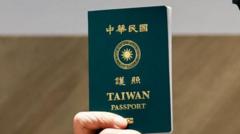Taiwan has officially condemned the recent ban imposed by Somalia, which prohibits entry or transit for travelers holding Taiwanese passports. This travel ban, effective from April 30, follows a directive from the Somali civil aviation authorities and has been perceived by Taiwan as politically motivated, particularly under the influence of China.
Taiwan's foreign ministry made an urgent plea to the Somali government for an immediate revocation of the ban and criticized Somalia for what it termed a "misinterpretation" of UN Resolution 2758. The Taiwanese government highlighted this ban as an infringement on the travel rights of its citizens. Moreover, they advised Taiwanese citizens against traveling to Somalia or its breakaway region, Somaliland, for their own safety.
Relations between Taiwan and Somaliland have been growing, particularly since both regions established mutual embassies in 2020. Somalia has yet to issue an official response to Taiwan's condemnation, but Chinese officials have expressed support for Somalia's travel restrictions. They termed it a "legitimate measure" reflective of Somalia's adherence to the One-China principle, which views Taiwan as part of its territory.
Taiwan, which operates under its constitution and conducts free elections, continues to navigate its sovereignty amid the increasing pressure from China, which has diminished Taiwan's international recognition to just a handful of countries.
As a self-declared independent state, Somaliland has its own governance frameworks and regularly held elections, while Somalia struggles with internal instability exacerbated by militant threats. The diplomatic friction continues to escalate, raising concerns about the future of relations in the region and the safety of travelers caught in the political crossfire.

















